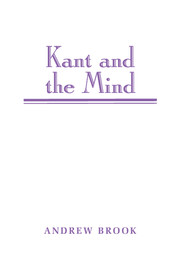Book contents
- Frontmatter
- Contents
- Preface
- 1 The contemporary relevance of Kant's work
- 2 Kant's theory of the subject
- 3 Kant's conception of awareness and self-awareness
- 4 Kant's theory of apperceptive self-awareness
- 5 The mind in the Critique of Pure Reason
- 6 The first-edition subjective deduction: the object of ‘one experience’
- 7 Kant's diagnosis of the Second Paralogism
- 8 The Third Paralogism: unity without identity over time
- 9 The second-edition subjective deduction: self-representing representations
- 10 Nature and awareness of the self
- Notes
- Bibliography
- Index of passages cited
- General index
8 - The Third Paralogism: unity without identity over time
Published online by Cambridge University Press: 05 June 2012
- Frontmatter
- Contents
- Preface
- 1 The contemporary relevance of Kant's work
- 2 Kant's theory of the subject
- 3 Kant's conception of awareness and self-awareness
- 4 Kant's theory of apperceptive self-awareness
- 5 The mind in the Critique of Pure Reason
- 6 The first-edition subjective deduction: the object of ‘one experience’
- 7 Kant's diagnosis of the Second Paralogism
- 8 The Third Paralogism: unity without identity over time
- 9 The second-edition subjective deduction: self-representing representations
- 10 Nature and awareness of the self
- Notes
- Bibliography
- Index of passages cited
- General index
Summary
To my mind, Kant's attack on the Third Paralogism surpasses all other short treatments of the implications for personal identity (identity over time) of the unity of consciousness and the sense of our persistence that goes with it. In brief, Kant shows that neither the unity of consciousness nor our sense of persistence as conveyed in memory and other ways reveals identity, and he lays the foundations of an argument that the unity of consciousness has little or no temporal depth at all. Memory specifically and temporal representation in general require unity of consciousness, and at least one major form of unity requires some forms of memory, namely, synthesis of recognition; but unity, memory, and temporal representation generally are quite compatible with a person being merely the latest in a series of minds or souls or subjects (A363n). Against our intuitions, Kant shows that even a memory of having an earlier experience and doing an earlier act is no proof that it was had or done by the person who now remembers having or doing it. Equally, our sense that we have persisted for quite some time (normally, continuously since about age four or five) is quite compatible with not having persisted for anything like that long. Memory and the sense of having persisted require unity of consciousness, and this unity ‘reaches back’ into the past in a sense.
- Type
- Chapter
- Information
- Kant and the Mind , pp. 179 - 207Publisher: Cambridge University PressPrint publication year: 1994



